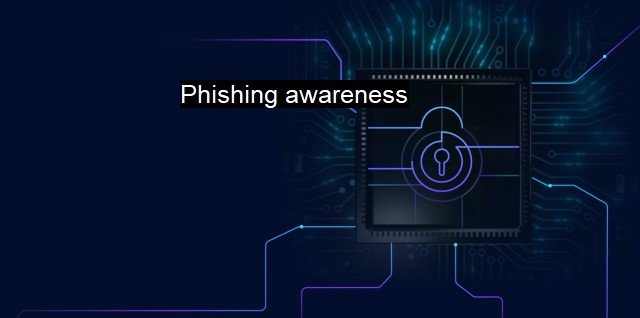What are Phishing awareness?
Phishing Awareness: Recognizing, Avoiding, and Reporting the Biggest Cybersecurity Threat Facing Individuals and Businesses Today
Phishing Awareness is a critical aspect of cybersecurity education. It entails making internet users—both individuals and corporations—cognizant of phishing attacks, enabling them to identify, avoid, and report any suspicious activities they encounter online. the term 'phishing' refers to a type of deception where cybercriminals design a technological trap to dupe unsuspecting web users into revealing sensitive data such as their passwords, credit card numbers, or other confidential information. Often masquerading under the guise of reputable entities like banks, online retailers and even charities, these cyber rogues adhere to an array of subtle techniques that aim to hoodwink internet users.Phishing Awareness can be the frontline defense, a prophylactic strategy, against these cyber threats. Because phishing scams have evolved into a formidable cybersecurity issue, it demands vigilant, informed, and proactive interdiction to contain them.
Phishing scams are materialized through various delivery mechanisms. Usually, phishers resort to email or text messages containing alluring messages that can provoke curiosity or a sense of urgency in the individuals who receive them. A typical phishing email may impersonate a reputable financial institution, informing the recipient of an "urgent issue" that necessitates immediate attention. When the individual clicks on the embedded link to "fix" the alleged problem, they are redirected to a phony webpage almost indistinguishable from the genuine one, rigged to harvest sensitive data.
Anti-virus software, while instrumental in identifying and mitigating phishing attacks, do not offer 100% protection. This is where Phishing Awareness comes to the rescue. It encourages a proactive approach to internet use, instructing users to scrutinize emails and messages, not rush into immediately acquiescing to calls for confidential information, peer into the actual URLs of emails and websites, and buttress their online interactions with antivirus software that features phishing-filter mechanisms.
Being aware of phishing also entails understanding different types of phishing tactics such as spear-phishing and whale phishing. In Spear phishing, cybercriminals target specific individuals or businesses rather than the general public with personalized messages, making it more convincing and difficult to detect. On the other hand, whale phishing targets high-profile individuals like CEOs or other corporate executives.
Phishing Awareness, meanwhile, extends beyond recognizing threats. It also includes knowing what actions to take in response to suspicious digital activities. User responses can entail such actions as reporting suspicious email to the respective officials in their organization; not responding to or following the instructions in the suspicious message; not clicking on links, opening attachments or images from unverified sources; and updating operating system and desktop applications to ruthlessly attack malicious phishing software.
Conclusively, Phishing Awareness is an essential appendage to antivirus solutions in the modern digital landscape. Its increasing importance indicates how vital personal vigilance is as cybercriminals continue to refine their art of deception. This is more of a continuous consciousness, an organic understanding that must adapt in rhythm with the evolving methods of cyber threats. Antivirus software serves as a mechanical aid, staunching cyber wounds that expose underlying sensitive data to the gluttonous appetite of cybercrime; yet, if coupled with an in-depth awareness of phishing, internet users can do more than just being passive bystanders but active participants in cybersecurity defense, warding off phishing attacks even before they slip through malicious fingers.

Phishing awareness FAQs
What is phishing and how does it work?
Phishing is a type of cyber attack that involves tricking individuals into divulging personal or sensitive information, such as passwords or credit card numbers, by posing as a trusted entity. This can be done through emails, text messages, or fake websites, which appear to be legitimate but are designed to steal data.What are some common signs of phishing attempts?
Phishing attempts often rely on urgency or fear tactics to coerce individuals into acting quickly, so be wary of emails or messages that demand immediate action or threaten negative consequences. Additionally, check for typos, inconsistencies in branding or logos, and suspicious links or attachments. Always hover over links to see their true destination before clicking them.How can I protect myself from phishing attacks?
The best way to protect yourself from phishing attacks is to be vigilant and cautious when receiving unsolicited or suspicious emails or messages. Always verify the sender's email address or phone number, and never provide confidential information or click on links without verifying their legitimacy. Use antivirus software and keep it up to date, and enable multi-factor authentication whenever possible to add a layer of security to your accounts.What should I do if I fall victim to a phishing attack?
If you believe that you have fallen victim to a phishing attack, immediately change your passwords for any affected accounts and contact your bank or financial institution to report any unauthorized transactions. You may also want to file a report with the FBI's Internet Crime Complaint Center. Be sure to stay vigilant and continue monitoring your accounts for signs of fraudulent activity.| | A | | | B | | | C | | | D | | | E | | | F | | | G | | | H | | | I | | | J | | | K | | | L | | | M | |
| | N | | | O | | | P | | | Q | | | R | | | S | | | T | | | U | | | V | | | W | | | X | | | Y | | | Z | |
| | 1 | | | 2 | | | 3 | | | 4 | | | 7 | | | 8 | | |||||||